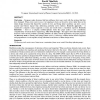1361 search results - page 92 / 273 » Simulation for recurring decisions |
CORR
2010
Springer
14 years 8 months ago
2010
Springer
We consider model-based reinforcement learning in finite Markov Decision Processes (MDPs), focussing on so-called optimistic strategies. Optimism is usually implemented by carryin...
IJHCI
2010
14 years 8 months ago
2010
Motivation – Designers make decisions that later influence how users work with the systems that they have designed. When errors occur in use, it is tempting to focus on the acti...
109
click to vote
INFOCOM
2010
IEEE
14 years 8 months ago
2010
IEEE
—Optimal scheduling for concurrent transmissions in rate-nonadaptive wireless networks is NP-hard. Optimal scheduling in rate-adaptive wireless networks is even more difficult, ...
PODC
2010
ACM
15 years 1 months ago
2010
ACM
: The Borowsky-Gafni (BG) simulation algorithm is a powerful reduction algorithm that shows that t-resilience of decision tasks can be fully characterized in terms of wait-freedom....
IEAAIE
2009
Springer
15 years 4 months ago
2009
Springer
A computational agent model for monitoring and control of a virtual human agent’s resources and exhaustion is presented. It models a physically grounded intelligent decision maki...

